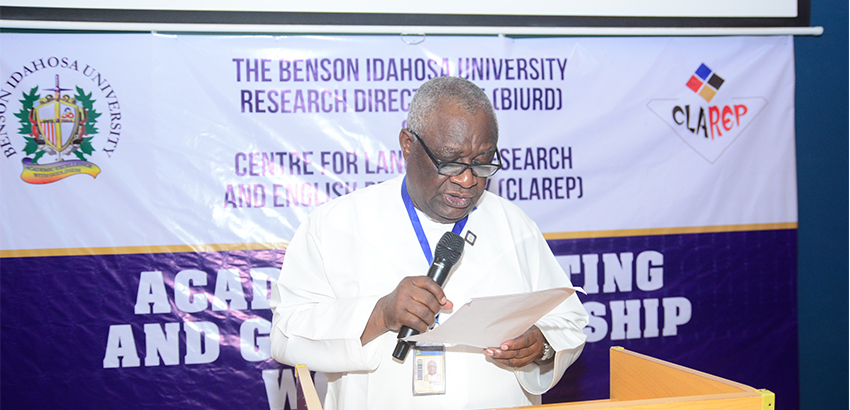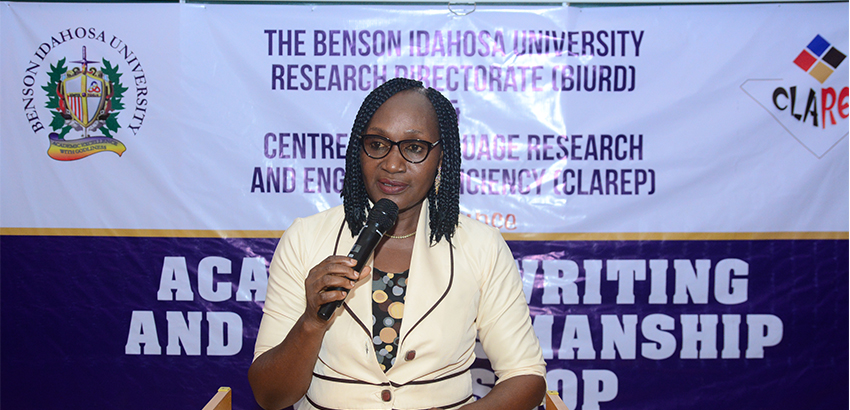Archives for the Month: June 2019
The Dean, School of Post graduate Studies, Prof. Sanni Bamidele, has said that in the next ten years, school fees alone would not be sufficient to sustain universities, hence the need for alternative sources of fund.
He made this known during the Academic Writing and Grantmanship workshop organized by the Benson Idahosa University Directorate of Research and the Centre for Language Research and English Proficiency (CLAREP).
He said that in seeking alternative sources of fund, the conduct of world class research came to his mind.
He said: “The big question that came to mind in pursuing this plan was, who are those to conduct world class research at Benson Idahosa University by 2030 to attract 40% revenue”? Looking around Benson Idahosa University community for answer to this question, I could see a lot of potentials waiting to be harnessed. Realising that potential alone would not deliver our strategic goal; the Vice Chancellor’s first mandate to the Directorate of Research was to build the capacity of academic staff of Benson Idahosa University towards achieving our strategic goal. Thus, this workshop on academic writing and grantmanship is a product of that mandate
According to him, the establishment of this unit is very strategic to the University’s vision of ensuring that at least 40% of its revenue by the year 2030 comes from research
In her welcome address, the Director of Benson Idahosa University Research Directorate, Prof. Alexandra Esimaje, said that the workshop seeks to build knowledge capital and also build capacities for skills through academic mentoring and knowledge transfer.
She assured participants that after the workshop, their academic and research profiles will receive a boost and their visibility of at the planes of scholarship highly enhanced.
The 2-day workshop which was hosted by Benson Idahosa University had facilitators and participants from various universities from across Africa.
The Acting Dean, Faculty of Law, Dr. (Mrs.) Theresa Akpoghome, in this interview with Communication and Brand Strategy Unit (CBSU), speaks on the dwindling quality of education, misplaced government priorities, and adverse effects of plagiarism.
Excerpts:
How will you rate the country’s education sector?
I would say that we are trying but there is room for improvement. We are not there yet. In terms of percentage, I will rate Nigeria 55%.
What factors can be blamed for the dwindling quality of education?
First and foremost, the quality of inspection and supervision of schools by the regulators has dropped. This is made worse by the culture of corruption and lack of integrity among the education stakeholders.
Most schools lack well equipped libraries. This can be attributed to insufficient funds at the disposal of most schools. Few years back we had situations where states could boast of Libraries, and students were in the habit of going to Libraries to study, even during holidays. That culture has died and Libraries exist today to fulfill all righteousness. We must understand that the Library is the heart beat of any institution and efforts must be made to equip libraries. The Library stock comprises texts needed to support teaching and learning as well as specialized texts and journals to support research at all levels.
Some students want to earn degrees without working for it. They must be made to understand that it pays to study and they must apply themselves to the primary reason why they are in school.
It is sad that some parents have relinquished their responsibilities towards their children. These parents believe that it is a colossal waste of time to send children to school as most graduates are unemployed. Instead of encouraging their wards to study, they prefer to have them assist in their petty trading. Some parents even allow their wards to buy grades and enroll them at “miracle centers” for external examinations.
How do you think the government can assist the Private Higher Institutions?
The difference between private and public universities lies in the means of funding them. Government funds public universities while the private universities are tied to the tuition fees they receive. This simply means that tuition fees in private universities are heavy while that of public schools are subsidized with the tax payers fund. While the argument of funding private universities with tax fund will always go against the private universities, the government can still do a lot to enhance the fortunes of the private universities.
Private universities and their students can access loans and scholarships. Since they do not benefit from the Tertiary Education Trust Fund (TETFUND), they should be able to access loans operated by the Nigerian Education Bank. Parents of children in public and private universities pay taxes and their wards should not be denied access to the benefits of these taxes
Again, Government must ensure a level-playing field for all actors in the industry. The criteria for approving courses for schools must be the same both on paper and in practice. Owners of private universities must not be given unattainable standards to meet before approval can be given to them, when it is obvious that some government owned schools do not have ‘all’ that is required before they take off.
There is always an argument about the better between students of public and private universities. How can this be resolved?
Well, the argument is not one that can be resolved. There are excellent students in both private and public universities. Both institutions have their areas of strength and weaknesses also. But I can tell you that most Private Universities are better equipped than public schools. The student population is not much so, the facilities are adequate and better managed. The curricula of Private Universities are often more progressive. They are not rigid. Whether one attends a private or public university is a question of choice.
What are the adverse effects of plagiarism?
Plagiarism is the act of copying another person’s ideas or works and passing them off as yours without due acknowledgement. It is academic dishonesty and an ethical offence. Plagiarism is a problem because the people who plagiarize deprive themselves of opportunities to learn. The consequences vary from one jurisdiction to another. In Nigeria for instance, you can be suspended, made to repeat the assignment or retract the publication in question with apology. Your promotion can be stepped down or delayed. In some climes like the United States of America students can be expelled from school. It may be considered as misdemeanors punishable by fines and jail terms, not exceeding one year. It could also be a felony in some countries.

